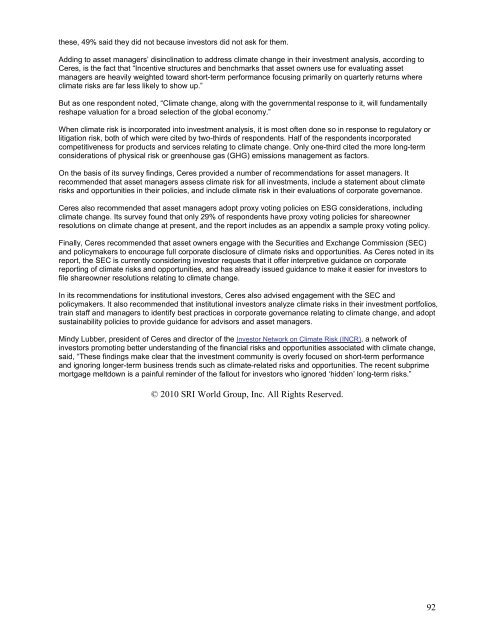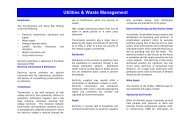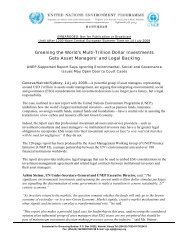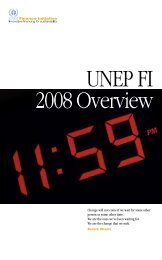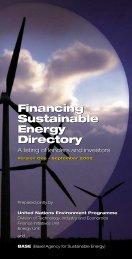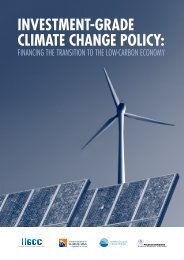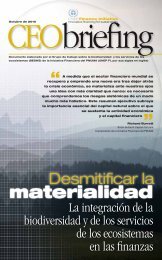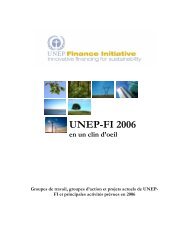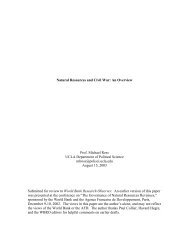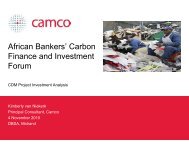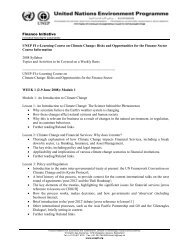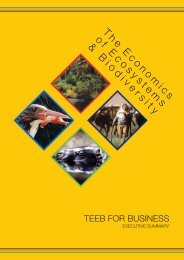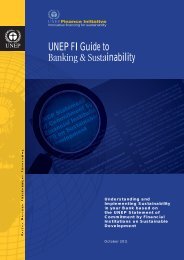UNEP FI Asset Management Working Group The - UNEP Finance ...
UNEP FI Asset Management Working Group The - UNEP Finance ...
UNEP FI Asset Management Working Group The - UNEP Finance ...
Create successful ePaper yourself
Turn your PDF publications into a flip-book with our unique Google optimized e-Paper software.
these, 49% said they did not because investors did not ask for them.<br />
Adding to asset managers’ disinclination to address climate change in their investment analysis, according to<br />
Ceres, is the fact that “Incentive structures and benchmarks that asset owners use for evaluating asset<br />
managers are heavily weighted toward short-term performance focusing primarily on quarterly returns where<br />
climate risks are far less likely to show up.”<br />
But as one respondent noted, “Climate change, along with the governmental response to it, will fundamentally<br />
reshape valuation for a broad selection of the global economy.”<br />
When climate risk is incorporated into investment analysis, it is most often done so in response to regulatory or<br />
litigation risk, both of which were cited by two-thirds of respondents. Half of the respondents incorporated<br />
competitiveness for products and services relating to climate change. Only one-third cited the more long-term<br />
considerations of physical risk or greenhouse gas (GHG) emissions management as factors.<br />
On the basis of its survey findings, Ceres provided a number of recommendations for asset managers. It<br />
recommended that asset managers assess climate risk for all investments, include a statement about climate<br />
risks and opportunities in their policies, and include climate risk in their evaluations of corporate governance.<br />
Ceres also recommended that asset managers adopt proxy voting policies on ESG considerations, including<br />
climate change. Its survey found that only 29% of respondents have proxy voting policies for shareowner<br />
resolutions on climate change at present, and the report includes as an appendix a sample proxy voting policy.<br />
Finally, Ceres recommended that asset owners engage with the Securities and Exchange Commission (SEC)<br />
and policymakers to encourage full corporate disclosure of climate risks and opportunities. As Ceres noted in its<br />
report, the SEC is currently considering investor requests that it offer interpretive guidance on corporate<br />
reporting of climate risks and opportunities, and has already issued guidance to make it easier for investors to<br />
file shareowner resolutions relating to climate change.<br />
In its recommendations for institutional investors, Ceres also advised engagement with the SEC and<br />
policymakers. It also recommended that institutional investors analyze climate risks in their investment portfolios,<br />
train staff and managers to identify best practices in corporate governance relating to climate change, and adopt<br />
sustainability policies to provide guidance for advisors and asset managers.<br />
Mindy Lubber, president of Ceres and director of the Investor Network on Climate Risk (INCR), a network of<br />
investors promoting better understanding of the financial risks and opportunities associated with climate change,<br />
said, “<strong>The</strong>se findings make clear that the investment community is overly focused on short-term performance<br />
and ignoring longer-term business trends such as climate-related risks and opportunities. <strong>The</strong> recent subprime<br />
mortgage meltdown is a painful reminder of the fallout for investors who ignored ‘hidden’ long-term risks.”<br />
© 2010 SRI World <strong>Group</strong>, Inc. All Rights Reserved.<br />
92


